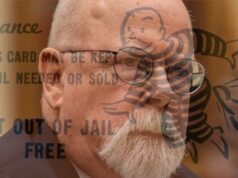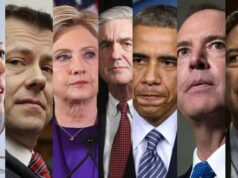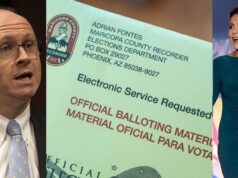In the five decades since Martin Luther King Jr. was shot dead by an assassin at age 39, his children have worked tirelessly to preserve his legacy, sometimes with sharply different views on how best to do that. But they are unanimous on one key point: James Earl Ray did not kill Martin Luther King.
For the King family and others in the civil rights movement, the FBI’s obsession with King in the years leading up to his slaying in Memphis on April 4, 1968 — pervasive surveillance, a malicious disinformation campaign and open denunciations by FBI director J. Edgar Hoover — laid the groundwork for their belief that he was the target of a plot.
“It pains my heart,” said Bernice King, 55, the youngest of Martin Luther King’s four children and the executive director of the King Center in Atlanta, “that James Earl Ray had to spend his life in prison paying for things he didn’t do.”

Until her own death in 2006, Coretta Scott King, who endured the FBI’s campaign to discredit her husband, was open in her belief that a conspiracy led to the assassination. Her family filed a civil suit in 1999 to force more information into the public eye, and a Memphis jury ruled that the local, state and federal governments were liable for King’s death. The full transcript of the trial remains posted on the King Center’s website.
“There is abundant evidence,” Coretta King said after the verdict, “of a major, high-level conspiracy in the assassination of my husband.” The jury found the mafia and various government agencies “were deeply involved in the assassination. … Mr. Ray was set up to take the blame.”
But nothing changed afterward. No vast sums of money were awarded (the Kings sought only $100), and Ray was not exonerated.
King’s two other surviving children, Dexter, 57, and Martin III, 60, fully agree that Ray was innocent. And their view of the case is shared by other respected black leaders.
“I think there was a major conspiracy to remove Doctor King from the American scene,” said Rep. John Lewis (D-Ga.), a 78-year-old civil rights icon. “I don’t know what happened, but the truth of what happened to Dr. King should be made available for history’s sake.”
Andrew Young, the former U.N. ambassador and Atlanta mayor who was at the Lorraine Motel with King when he was shot there, agrees. “I would not accept the fact that James Earl Ray pulled the trigger, and that’s all that matters,” said Young, who noted that King’s death came after the killings of John F. Kennedy and Malcolm X and just months before the slaying of Robert F. Kennedy.
“We were living in the period of assassinations,” Young said.
Dave Garrow, a Pulitzer Prize-winning biographer of King, said that “the King children are part of a larger population of American people who need to believe that the assassination of a King or a Kennedy must be the work of mightier forces” rather than victims “of small-fry, lifetime losers.”
“People need to see something of a balance between effect and cause,” Garrow said. “That if something has a huge evil effect, it should be the result of a huge evil cause.”
Even those who believe that Ray, who died in prison in 1998, killed King tend to think that he received assistance from someone, whether it was his two brothers or the FBI or the mafia.
Because Ray suddenly pleaded guilty in 1969, less than a year after the shooting, there was no trial. The largest government investigation, led by the House Select Committee on Assassinations under chief counsel Robert Blakey, theorized in 1979 that Ray committed the killing in the hope of collecting a $50,000 bounty offered by supporters of then-presidential candidate George Wallace in St. Louis, where Ray’s brothers lived.
The front page of The Washington Post on April 5, 1968.
But there was no definitive evidence to prove the theory, and the Wallace supporters were dead by 1979. Blakey said recently he had tried to prove a conspiracy but could not. If the FBI or CIA was involved, they had destroyed the documentation of it by 1979, he said.
“I have no stake in our outcome,” Blakey said. “You come up with a better outcome, with evidence to support it, I’ll support your theory.” He remains adamant that Ray was the gunman but likely had help that should have been investigated in 1968 and was not.
John Campbell, who investigated the case for years in the Shelby County, Tenn., district attorney’s office, said that Ray’s version of events “kept changing.” His office issued a report in 1998 saying Ray was responsible.
“I’m not saying he didn’t have help,” Campbell said. “But he didn’t have the FBI, the CIA, the Memphis police or the mafia.”
After Coretta King and her family pleaded with President Bill Clinton in 1998 to reinvestigate the case, Attorney General Janet Reno assigned civil rights special counsel Barry Kowalski, who previously prosecuted the Los Angeles police officers in the Rodney King beating, to review the newest conspiracy allegations. In 2000, even after reviewing the results of the 1999 civil trial in Memphis, Kowalski concluded that Ray was guilty and that there was no government conspiracy.
Astride all this controversy for the last 40 years has been William Pepper, a New York lawyer and civil rights activist who knew and worked with King. Pepper first visited Ray in prison in 1978 along with Ralph Abernathy, one of King’s closest associates. Pepper became convinced of Ray’s innocence and continued to investigate the case even after Ray died.
Pepper wrote three books outlining the conspiracy, most recently “The Plot to Kill King” in 2016, which were largely ignored by the media.
He defended Ray in a mock trial on HBO in 1993 (Ray was found not guilty), and filed and tried the Memphis civil suit that found the government liable for King’s death.
William Pepper, shown here in his New York office, has never stopped investigating the King assassination. He does not believe James Earl Ray was the killer. (Michael Noble Jr. for The Washington Post)
He has spoken around the world to anyone who will listen, including recently at the National Civil Rights Museum at the Lorraine Motel, where King was killed. Pepper was sued once for defamation, by an Army soldier he accused of participating in the conspiracy, and a South Carolina judge entered an $11 million default judgment against him in 2000.
In recent years, Pepper has tracked down witnesses in Memphis who support his theory of the case: that J. Edgar Hoover used his longtime assistant, Clyde Tolson, to deliver cash to members of the Memphis underworld, that those shadowy figures then hired a sharpshooting Memphis police officer, and that officer — not Ray — fired the fatal shot.












613116 128656Normally I do not learn post on blogs, even so I would like to say that this write-up very pressured me to have a look at and do so! Your writing style has been surprised me. Thank you, quite fantastic post. 256052
914961 468066Great post, I believe website owners should acquire a good deal from this web site its quite user pleasant. 815751
700440 369115Im having a little problem I cant subscribe your feed, Im making use of google reader fyi. 137104
Together with every little thing that seems to be developing throughout this area, all your viewpoints are generally relatively exciting. Nevertheless, I appologize, but I can not subscribe to your entire plan, all be it stimulating none the less. It would seem to everyone that your remarks are generally not totally justified and in fact you are your self not completely confident of the point. In any case I did appreciate looking at it.
470976 757504Naturally I like your web-site, nevertheless you need to have to check the spelling on several of your posts. A lot of of them are rife with spelling issues and I discover it really silly to inform you. On the other hand I will certainly come again once again! 758038
Marvelous, what a web site it is! This weblog provides valuable information to us, keep it up.
455144 910612 You really should take part in a contest for one of the finest blogs on the internet. I will recommend this website! 488624
Comments are closed.